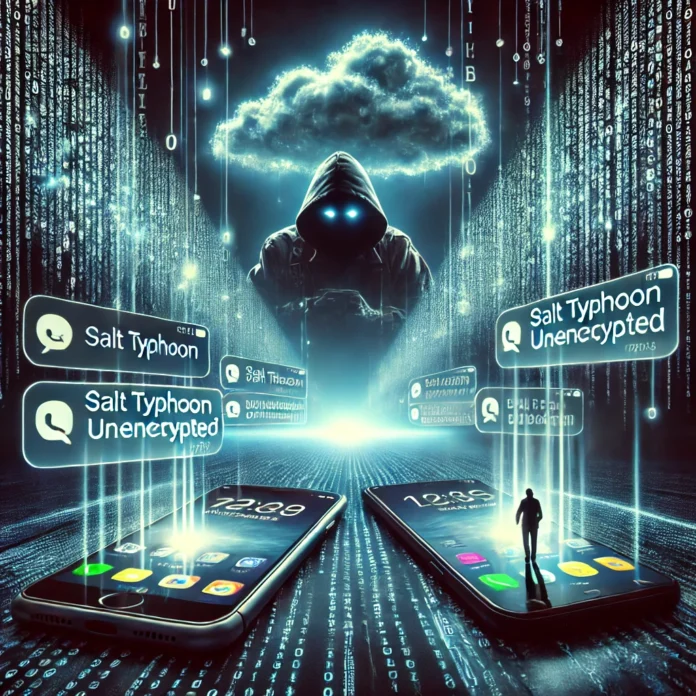Imagine this: every text you send, every call you make, and every detail of your private life is available to hackers working for a foreign power. Sound extreme? It’s not. According to the FBI, this is the new reality, thanks to the devastating Salt Typhoon cyberattack.
The attack, attributed to Chinese hackers, has infiltrated major U.S. telecom providers, including AT&T, Verizon, T-Mobile, and Lumen Technologies. The breach is so severe that the FBI and the Cybersecurity and Infrastructure Security Agency (CISA) are issuing an urgent warning: stop sending unencrypted texts between iPhones and Androids.
This isn’t just a tech issue—it’s a matter of national security.
Salt Typhoon: The Digital Storm
Dubbed Salt Typhoon, this cyberespionage campaign is unprecedented in scope. Hackers gained access to sensitive telecom infrastructure, stealing call logs, text messages, and even listening to live phone calls of targeted individuals. And it’s not just political operatives and government officials at risk—anyone who texts or calls using vulnerable systems is exposed.
Jeff Greene, a cybersecurity director at CISA, didn’t mince words: “Encryption is your friend.” It’s a simple truth that should resonate with anyone who values their privacy. But here’s the catch—most Americans aren’t using encryption for their daily communications.
Why Your Texts Are a Hacker’s Dream
When you send a text from an iPhone to another iPhone, or from an Android to another Android, your message is encrypted. This means only you and the recipient can read it. But cross-platform texts—like when an iPhone user messages an Android user—are not end-to-end encrypted. These texts pass through telecom systems in plain, readable form, vulnerable to anyone with malicious intent.
The Salt Typhoon hackers exploited this gap. The FBI has reported that these vulnerabilities allowed attackers to steal massive amounts of data, particularly targeting high-value areas like Washington, D.C., where both political campaigns and government offices were affected.

FBI’s Message: Encrypt or Be Exposed
The FBI’s solution? Start using encrypted messaging apps like Signal or WhatsApp immediately. These apps offer end-to-end encryption, meaning even the app creators can’t read your messages. But don’t stop there:
- Update Your Devices: Software updates often include security patches for newly discovered vulnerabilities.
- Enable Multifactor Authentication: This adds an extra layer of security to your accounts.
- Avoid Default Messaging Apps: Built-in texting apps aren’t always secure, especially for cross-platform communication.
The Real Problem: Corporate Neglect
While the FBI’s advice is crucial, it’s also frustrating. Why should the burden fall on everyday people to patch a hole that telecom giants allowed to exist? These companies rake in billions in profits, yet they’ve failed to implement universal encryption standards that could prevent breaches like Salt Typhoon.
This isn’t just a failure of technology; it’s a failure of responsibility. Telecom executives and policymakers have known about these vulnerabilities for years. The fact that encryption isn’t yet mandatory for all communications is a damning indictment of their priorities.
A Wake-Up Call for the Government
It’s not just the telecom companies at fault. The federal government has the power to regulate these industries, enforce encryption standards, and provide the funding needed to secure critical infrastructure. Instead, Americans are left scrambling to protect themselves in the wake of massive breaches.
If the Salt Typhoon attack doesn’t spur action, what will? This breach has exposed the personal lives of millions and compromised national security. The FBI’s warning should be a wake-up call, not just for consumers, but for the lawmakers and executives who’ve allowed this crisis to unfold.
The Bottom Line
The Salt Typhoon attack is a stark reminder of how fragile our digital world really is. It’s a call to action for everyone—whether you’re texting friends about weekend plans or working in a sensitive government role. Secure your communications, demand better protections, and don’t let hackers turn your private life into their next trophy.
Because when the FBI warns you to change your habits, it’s not a suggestion—it’s a lifeline.
Further Reading and References
- Eric Revell, “FBI warns texts between Android and iPhone users pose cyber risk,” FOXBusiness, December 6, 2024. FOXBusiness (Retrieved: December 7, 2024).
- Kailey Tracy, “‘Sprawling’ cyberattack leads FBI to warn against sending texts,” FOX 13 News, December 6, 2024. FOX 13 News (Retrieved: December 7, 2024).
- Kevin Collier, “How to make sure texts and calls are encrypted after the FBI’s security warning about Chinese hackers,” NBC News, December 4, 2024. NBC News (Retrieved: December 7, 2024).
Disclaimer
This article is an opinion piece that provides analysis, commentary, and educational insight on recent news topics, informed by reliable sources. It reflects the author’s sole opinion, and neither the newspaper nor its website, as a news, commentary, and educational platform, bears responsibility for any misinterpretation or consequences arising from this analysis. For the latest breaking news and official results, refer to the news organizations cited above. This article does not constitute primary reporting.




